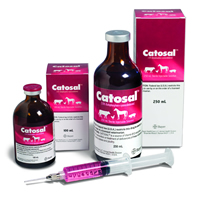Bayer Animal Health Introduces Catosal™ Sterile Solution
First prescription B12 and organic phosphorus injectable is now available for prevention or treatment of deficiencies.
SHAWNEE, Kan. (January 29, 2009) — Catosal™ (10% Butaphosphan + cyanocobalamin) Sterile Solution, the first and only injectable source of vitamin B12 and phosphorus, is now available for prevention or treatment of deficiencies of these nutrients in cattle, swine, horses and poultry in the United States. Available only by prescription from a veterinarian, Catosal is an important adjunct therapy for animals that are convalescing or susceptible to behavioral or environmental stress. Deficiencies of B12 or phosphorus are associated with delayed recovery; and, as a source of B12 and phosphorus, Catosal prevents and treats these deficiencies.
 “Catosal is a great supportive therapy for sick animals and an excellent preventative care measure for healthy animals subjected to suppressed feed intakes or stress,” says Todd Firkins, livestock category manager for Bayer Animal Health. “Stress and sickness can severely impact the bottom line of any operation, so we are excited to introduce this product that will allow producers to provide better care for their animals by preventing or treating deficiencies of B12 and phosphorus.”
“Catosal is a great supportive therapy for sick animals and an excellent preventative care measure for healthy animals subjected to suppressed feed intakes or stress,” says Todd Firkins, livestock category manager for Bayer Animal Health. “Stress and sickness can severely impact the bottom line of any operation, so we are excited to introduce this product that will allow producers to provide better care for their animals by preventing or treating deficiencies of B12 and phosphorus.”
Nutrient deficiencies and other serious problems, especially in recovering animals, frequently occur due to stress caused by numerous factors, including calving, shipping and environmental conditions. Stress causes the hormone cortisol to be released into the bloodstream, which can impair the immune response, cause loss of appetite, increase susceptibility to disease and reduce growth rate.
Catosal Sterile Solution minimizes the effects of nutrient and mineral deficiencies by providing B12, the vitamin compound associated with enhanced liver metabolism and healthy immune response, and Butaphosphan, a unique organic source of phosphorus with a more complex molecular structure than other forms of phosphorous used in food-animal production.
Additionally, transition, stressed and convalescing dairy animals have elevated BHB (beta hydroxybutyrate) levels, making them predisposed to clinical ketosis. Ketosis can cause decreased feed intake and milk yield, as well as negative energy balance, fatty liver syndrome, fertility impairments and post-parturient disorders. In clinical trials, the administration of Catosal demonstrated the restoration of appetite and accelerated ketosis recovery rates.
“For years, Catosal has proven its efficacy worldwide,” says Jim Sears, senior technical services veterinarian for Bayer Animal Health. “Now, U.S. veterinarians will also have access to this important therapy for the prevention and treatment of phosphorus and vitamin B12 deficiencies.”
For more information about Catosal, call Bayer Veterinary Services at 1-800-422-9874 or visit www.bayerdvm.com.
Editor’s Note: This article was provided as a news release by Bayer Corp., PO Box 390, Shawnee, KS 66201-0390; 913-268-2000. For more information contact Bob Walker, director of communications and public policy, at 913-268-2577.
Bayer HealthCare, a subsidiary of Bayer AG, is one of the world’s leading, innovative companies in the healthcare and medical products industry and is based in Leverkusen, Germany. The company combines the global activities of the Animal Health, Consumer Care, Diabetes Care and Pharmaceuticals divisions. The pharmaceuticals business operates under the name Bayer Schering Pharma AG. Bayer HealthCare’s aim is to discover and manufacture products that will improve human and animal health worldwide. With sales of EUR 956 million (2007) the Animal Health Division is one of the world’s leading manufacturers of veterinary drugs. The division manufactures and markets approximately 100 different veterinary drugs and care products for food-supplying animals and companion animals (dogs, cats, horses).
© 2009 Bayer HealthCare LLC, Animal Health Division, Shawnee Mission, KS 66201
Bayer®, the Bayer Cross and Catosal™ are trademarks of Bayer.

